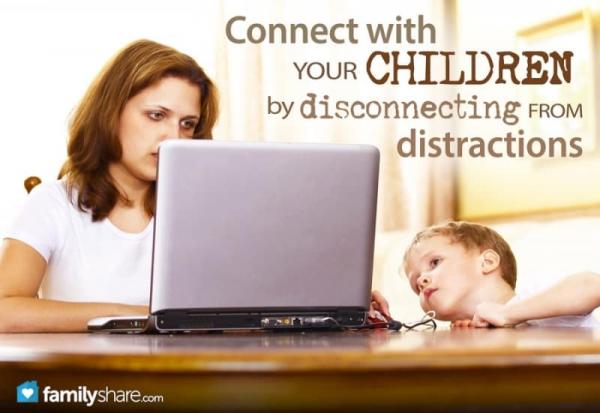
Children need the attention and interaction of their parents, but parents can be surrounded by technology every minute of the day. Smart phones, tablets, computers, apps, games, television, blogs and websites - all of these can become constant distractions.
Dr. Neal Halfon, the director of the UCLA Center for Healthier Children, Families, and Communities, addresses the problems that technology can bring to parents and children. He describes an incident of what he calls "parental benign neglect."�
"I watched as a young, middle-class mother in her early 20s placed her happy 9-month-old on her lap. The adoring mother engaged the infant in beautifully playful, expressive dance. After about three minutes, the mom's phone rang and she took a short call - during which she continued to smile, mouth words, touch and play. But instead of putting her phone away, mom began texting. The baby cooed and tried to get mom's attention, but there was little response. The baby gradually became agitated, fussy and unresponsive to a few gentle pats from mom in place of real attention. After a few more minutes, the distressed and agitated infant stuck her hand in her mouth, organized herself around the sucking that was now substituting for real-time interaction and gazed listlessly at the lights overhead, emotionally exhausted and distraught."�
The mother needed to connect with her child much more than she needed to text, but she neglected her child because she was distracted by technology.
I get distracted quite a lot. I don't mean to be, but sometimes I find myself playing a game, texting or checking Facebook instead of paying attention to my daughter. I've been working on it. Here are some suggestions that have helped me resist distraction and better connect with my daughter.
Get rid of the unnecessary devices and applications
I used to own a tablet. Then my toddler daughter dropped it on a cement floor and it broke. I was upset at first, but after a few days, I was actually glad the tablet broke. I felt free without it. I had mostly used it to waste time, and I found that I didn't need it.
Now the only technological devices I own are an old-fashioned cell phone, a desktop computer and an e-reader. If I did own a television, tablet, or smartphone, they would mostly just distract me from interacting with my daughter.
I've also disabled games on my computer and blocked some time-wasting websites. I don't quite have the self-control to stay away from the game or website if it is accessible, so I just get rid of them.
It's always helpful to evaluate how you are spending your time and determine if you need to get rid of a game, an app or an entire device. Ask yourself, is this helping me be a good parent or is mostly just a distraction?
Turn off alerts
There have been times when I have been more connected to my technology than I have been connected to my child. Sometimes when my daughter wants my attention, I don't always respond right away. But when my phone makes a beeping sound, I want to look at it as soon as I can.
Blake Snow, who writes an Anti-Technologist column, suggests turning off all sound and visual alerts except for voice calls. This allows you to be present in the moment instead of being constantly distracted by emails or text messages that can wait.
Spend time each day completely disconnected
Rosemary M. Wixom, a leader of an international children's organization, says, "Precious moments of opportunity to interact and converse with our children dissolve when we are occupied with distractions. Why not choose a time each day to disconnect from technology and reconnect with each other? Simply turn everything off. When you do this, your home may seem quiet at first; you may even feel at a loss as to what to do or say. Then, as you give full attention to your children, a conversation will begin, and you can enjoy listening to each other."�
My mom recently decided to basically unplug the television. Whenever I visit her now, I find that the whole family talks and engages with each other a whole lot more. When devices are turned off completely, they can't distract us and we are forced to pay attention to the people around us.
I also find it helpful to spend time outside. I tend not to worry about a text message or a picture on Facebook when I'm out in the sunshine and watching my daughter run after lizards.
I'm getting better at not getting distracted. As I've tried to disconnect more from technology, I've paid better attention to my daughter. I laugh more and I have greater patience. Most importantly, I feel that I love and understand my daughter more than I ever have before.
Our children need our full attention. They need us to listen to them completely, engage with them and not be distracted by less-important status updates or texts. When we start to turn off our devices and tune it to our families, we are focused on what is really important.

